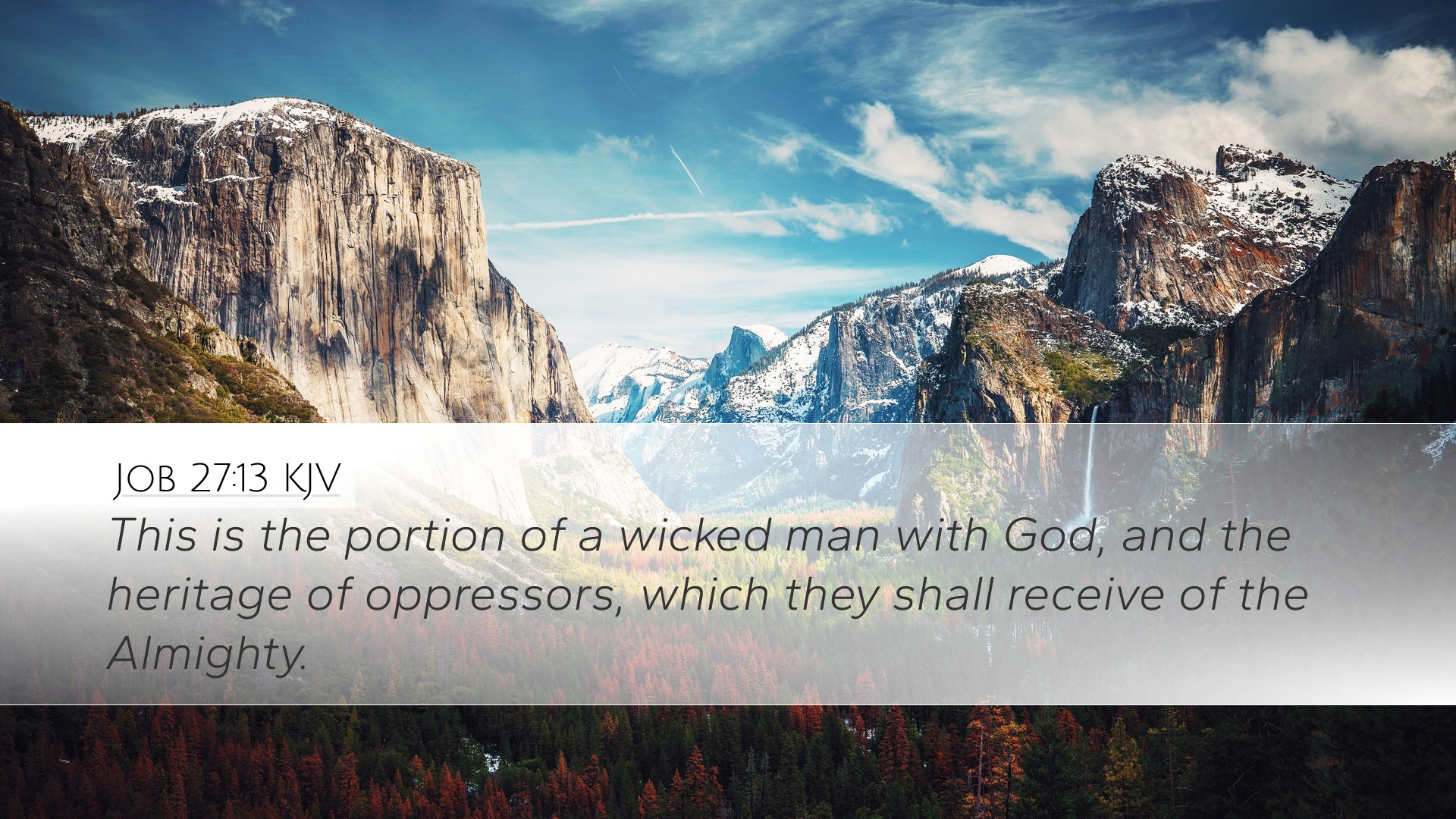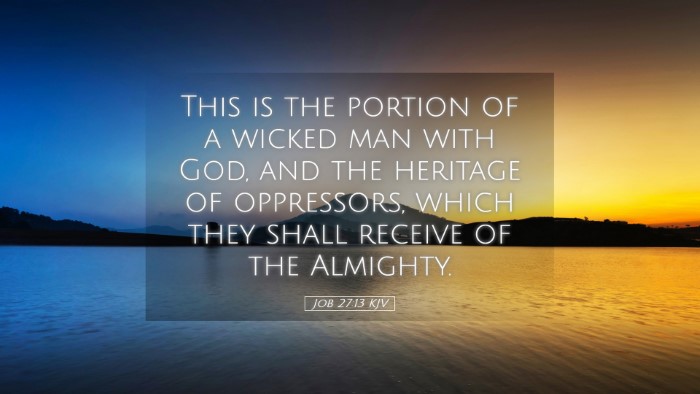Old Testament
Genesis Exodus Leviticus Numbers Deuteronomy Joshua Judges Ruth 1 Samuel 2 Samuel 1 Kings 2 Kings 1 Chronicles 2 Chronicles Ezra Nehemiah Esther Job Psalms Proverbs Ecclesiastes Song of Solomon Isaiah Jeremiah Lamentations Ezekiel Daniel Hosea Joel Amos Obadiah Jonah Micah Nahum Habakkuk Zephaniah Haggai Zechariah MalachiJob 27:13
Job 27:13 KJV
This is the portion of a wicked man with God, and the heritage of oppressors, which they shall receive of the Almighty.
Job 27:13 Bible Commentary
Commentary on Job 27:13
Job 27:13 states, "This is the portion of a wicked man with God, and the heritage of oppressors, which they shall receive of the Almighty." This verse provides profound insights into the nature of justice and the fate awaiting those who disregard God's commandments.
Overview of Context
The Book of Job explores the themes of suffering, justice, and divine sovereignty. Job, a man of integrity, finds himself amidst unmerited suffering. His friends insist that his suffering must be a punishment for sin, while Job steadfastly maintains his innocence. In this verse, Job articulates a crucial principle about the fate of the wicked, contrasting it with his own experience.
Insights from Public Domain Commentaries
Matthew Henry's Commentary
Matthew Henry highlights the seriousness with which Job views the fate of the wicked. He notes that Job, in his suffering, is aware of the judgment that awaits those who live in rebellion against God. Henry succinctly states that the inheritance of the wicked is marked by despair and destruction. He emphasizes that the "portion" signifies not just physical possessions, but a spiritual inheritance that leads to eternal consequences. This is a reminder that earthly success does not equate to divine approval.
Albert Barnes' Notes on the Bible
According to Albert Barnes, this verse serves as a declaration of Job regarding the ultimate fate of oppressors. He explains that Job is asserting a fundamental law of God’s governance: the wicked cannot escape accountability. Barnes also draws attention to the phrase "heritage of oppressors," suggesting that their accumulated gains are ultimately hollow and will not provide lasting security. He notes that Job finds comfort in proclaiming the certainty of divine justice, which will prevail despite the current reality of his own suffering.
Adam Clarke's Commentary
Adam Clarke delves deeper into the wording of the text, analyzing "the portion of a wicked man." Clarke argues that Job is employing a rhetorical device to contrast the temporal prosperity of the wicked with their ultimate doom. He emphasizes that this inheritance is a bitter one, filled with sorrows and regret. Clarke also points out that Job's insistence on the fate of the wicked reinforces the idea that God is just and that His judgment will manifest in due time.
Theological Implications
The theological ramifications of Job 27:13 should not be underestimated. This verse contributes to the broader discourse on the justice of God. Believers are reminded that God's judgment is both imminent and inevitable. It invites both the individual and the community to reflect on their deeds and the nature of their relationship with God.
Justice and Sovereignty
This verse serves as a pivotal reminder of God's sovereignty over human affairs. The assertion that oppressors will receive their due reflects the belief in a moral order that transcends human understanding. Job affirms that despite the appearance of injustice in the world, God will ultimately rectify all wrongs.
Affliction and Integrity
Job’s own sufferings highlight the tension between the righteousness of the faithful and the apparent prosperity of the ungodly. The verse prepares the backdrop for understanding that righteousness does not guarantee immediate reward, while wickedness does not ensure lasting success. It prompts believers to trust in God’s timing and the ultimate accountability that lies ahead.
Application for Contemporary Believers
For pastors, students, and theologians, the insights from Job 27:13 encourage a robust exploration of the character of God as just and merciful, despite the suffering that may be present in the believer's life. It presents critical questions of integrity and ethical living in a world that often seems unjust.
Cultivating Righteousness
Believers are called to reflect on their own lives, ensuring they are aligned with God's will. The reality of the fate of the wicked serves as a warning against complacency and moral laxity. Faithful living is contrasted sharply with the consequences of sin, reinforcing the notion that God honors righteousness.
Encouragement in Suffering
For those experiencing suffering, Job 27:13 provides encouragement that their struggles are not in vain. The assurance of God's justice allows individuals to maintain hope in the face of trials. It reassures them that God sees their plight and will ultimately act with righteousness.
Conclusion
Job 27:13 is a powerful testament to the truths of divine justice and the consequences of wickedness. Through the insights provided by Matthew Henry, Albert Barnes, and Adam Clarke, we gain a fuller understanding of this verse's significance. Believers are reminded to live righteously, remain faithful in trials, and trust in God's ultimate justice. This verse calls for a profound reflection on one's own life and alignment with God's will, serving as a guide in navigating the complexities of faith amid a world of suffering and injustice.


